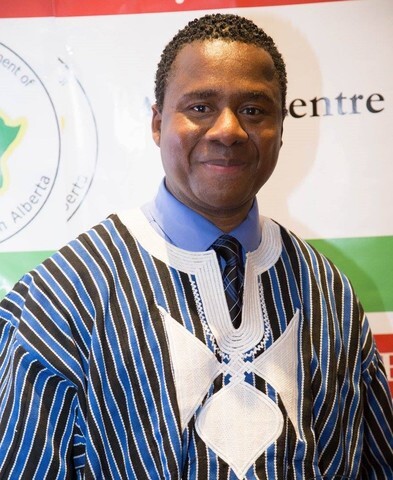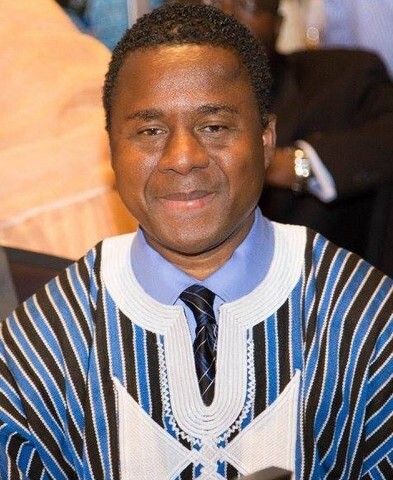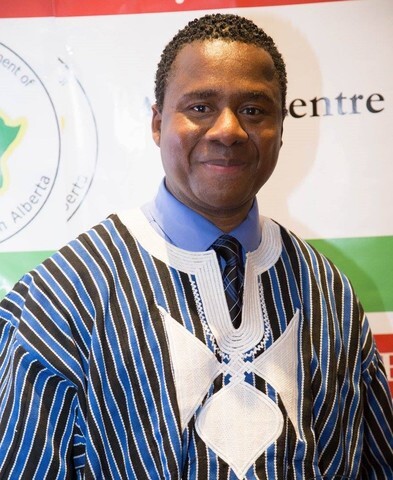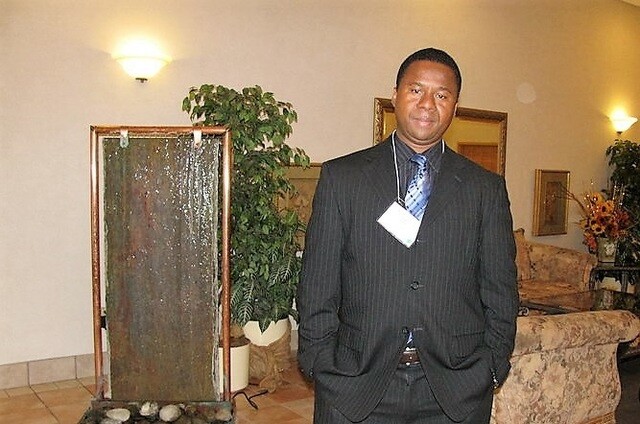In 1980, a man named Samuel Doe led a military coup d'état that overthrew the elected government of Liberia. Doe became the country's president, and, over the course of his 10 years in power, Liberia was ravaged by a civil war until rebels eventually assassinated President Doe, who belonged to the Krahn tribe. Suddenly, the life of any Liberian citizen of the Krahn tribe was in danger.
One such Krahn was Latter-day Saint John Gaye, who narrowly escaped death on numerous occasions. Most were not so lucky—over 600,000 people died in this, the First Liberian Civil War.
Gaye was born and raised in Christianity, the dominant faith of Liberia. He was brought up in a deeply religious home, and from an early age had a love of God and His word. So when he came across missionaries from The Church of Jesus Christ of Latter-day Saint, he was very interested in their message.
Gaye's missionary discussions were led by Elder J. Duffy Palmer, who later became the first mission president in Liberia. "He was very enthusiastic to teach me the gospel," Gaye says. "As the discussions continued, my knowledge of the restored gospel increased gradually. The experience was wonderful, so much so that I started telling my family about the discussions I was taking."
It was during these discussions that Gaye had what he describes as his first spiritual experience. In the middle of a conversation, the missionaries decided that they would sing "I Am a Child of God."
"It caught me by surprise, as I wasn't expecting the missionaries to sing a song," Gaye says. "But as they sang, I began to feel the Spirit and I just couldn't hide my feelings. I beamed with joy as I sat listening to people the age of my grandparents singing that they were children of God."
Gaye was baptized shortly thereafter and proceeded to dedicate his life to the Church, which dramatically changed his lifestyle. "My friends looked at me differently," he says. "I no longer participated in things I used to do."
He began to wear a white shirt and tie to church every Sunday, which was unusually elegant churchgoing apparel in Liberia. He decided that he would not miss church for anything. People started noticing Gaye's outward appearance and his attitude and became interested in learning more about the church he was attending. He eventually introduced many friends and family members to the gospel, as a member and later as a missionary.
Like most missionaries from Africa, Elder Gaye was unable to pay for his mission on his own. But the Church's missionary fund enabled Gaye and seven other native Liberians to be the first missionaries called from Liberia, and he served in the Liberia Monrovia Mission. Monrovia was the only city in the nation with a Latter-day Saint population, and Gaye and his companions were the first missionaries to proselyte there.
His first investigator, Henry Weah, was the father of the man who would become the first Liberian missionary to serve in Salt Lake City, Utah—Francis Weah.
"When I met [Henry], he was selling lottery tickets in a kiosk," Gaye recalls. "His circumstances were appalling. He was desperate for a change. He was ready for the gospel. Sometimes the Lord does not change our circumstances but sends His blessings to us as we go through the storms of life."
What Gaye didn't know was that his own storms were just beginning.
Sadly, seven months into his mission, political and social conflict erupted in Liberia. But even in his times of deepest trial, Gaye sought comfort from his new religion.
"My faith in God is what kept me going," he says. "When I am faced with challenges, even situations where there seems to be no way out, I often remind myself of what the Lord has done for me in the past. I am wholly dependent on the Lord; in Him alone I put my trust."
Even though Gaye had no role in the reign of President Doe, he became a hunted man—along with the rest of his Krahn tribe. To protect their families, most young Krahns joined the military to fight the rebels. Gaye, however, ignored the advice of his relatives to leave the country or join the military, opting to stay and complete his mission. And when the mission president and senior missionaries were forced to leave because of the fighting, Gaye and his companion continued conducting local sacrament meetings.
Before long, the danger became insurmountable. Gaye and his companion were forced to lock themselves in the room of a small house with no food, water, or electricity, waiting out the passage of a group of rebels, whom Gaye describes as "ferocious young men" who "seemed to have the appetite for killing." The rebels went door to door, looking for Krahns. Gunfire rang out around Gaye and his companion, and the angry shouts of rebels were a near-constant presence—but Gaye comforted himself by singing "Come, Come, Ye Saints" in his mind.
Unable to eat or drink, Gaye began fasting out of necessity. "For several days, I felt like I was in prison," he says. "I started to think about my loved ones, especially my mother. I wondered how she was doing. I wondered if she was thinking about me. Later I would learn that my relatives thought I was dead—nobody expected a Krahn to survive in a rebel-held area."
"Every day was a miracle to me," he continues. "I didn't know what to expect. Being a man of faith as I am, this was difficult for me. My constant prayer was to be able to safely get out of the area. When it looks like there's no way out of a dangerous situation, the Lord always makes a way inasmuch as we put our trust in Him. I knew I was in danger, but I strongly felt the Lord would rescue me somehow."
After much prayer, fasting, and trust in the Lord, Gaye came out of that harrowing situation—and many others like it—alive. Now, as he looks back, he sees the Lord's hand in every step of his journey. "If I wasn't a missionary at the time when the civil war erupted in Liberia, I would not be alive," he says. "I probably would have joined the military, and who knows what would have happened to me then?"
The story of Gaye and his fellow missionaries has become an inspiration to many through the film Freetown. The film depicts the struggle of Elder Gaye and the eight missionaries who helped protect him from the bloodthirsty rebels as they all tried to escape to safety. "I'm glad the movie came out and showed the story to the world," he says. But he also added that many miraculous events also occurred that the filmmakers didn't have time to include. "It is a great story of miracles," Gaye says.
"[One such miracle] occurred when my companion and I were still in the rebel-held area during the war," says Gaye. "The other six missionaries had been praying and fasting to leave Monrovia . . . by 2:00 p.m. [but that] the Lord must bring my companion and me before they leave."
At the time, Gaye and his companion knew nothing about the other missionaries fasting and praying for them. However, Gaye and his companion felt that they should make their way to the mission home that very same day the other missionaries had determined to leave.
"We had been in the rebel-held area for more than a week," Gaye said. "Early that morning, I told my companion that we had to leave and go to Monrovia. Without hesitation, he agreed and we started the long and dangerous walk that would last for several hours."
"During the escape from the rebel-held area, we passed through many dangerous areas where rebel fighters would normally stop and ask for people's tribal origin," Gaye continues. "During this time, we went by easily. Everything was just timely for us as we entered Monrovia and headed to the mission home. When we arrived, the rest of the missionaries were already in the car ready to leave for Freetown. It was almost 2:00 p.m. Upon seeing us, they rejoiced and said, 'Truly, the Lord is with us.' Miracles truly happen when we pray."
Today, Gaye finds that nearly every one of his actions is influenced by the trials of his past. For example, during one particularly frightening instance, Gaye found himself with a gun to his head, when he was unexpectedly rescued by a rebel.
"The interesting thing about this experience was that the rebel fighter who rescued me was from a tribe that was at war with my tribal group," Gaye says. "Literally, he was my enemy . . . this experience taught me a lot of lessons that have influenced my life ever since. I've learned to show love to all regardless of their affiliation to me. I have especially learned to be helpful even to strangers. The experience also shows that the bonds we make through the gospel of Jesus Christ are stronger than other ties in the world. Allegiance to tribal affiliation should not surpass the Savior's call to 'love one another.'"
Above all, Gaye has learned the value of missionary work. "The worth of souls is great in the sight of God," he says. "Missionary work is an opportunity for us to fulfill the commands the Savior gave us. He came for that purpose, to reconcile us back to the Father because . . . the gospel of Jesus Christ is what the world needs today."
About John Gaye

John Gaye works for the Government of Alberta and attends church with his family in Edmonton, Alberta, Canada. Although he didn't receive compensation for the movie, he says, "I am very glad that my story was told to the world through the movie. . . . Freetown tells a great story of faith."
However, the movie didn't share all of the miraculous events that took place. Gaye is currently working on a book to share more of the miracles that were left out of the movie.
"My story is a testimony of the power of prayer—a testimony of faith, courage, and commitment to serve the Lord," Gaye says. His book is expected to come out in 2017 and will give a complete account of the miracles, events, and faith that shaped his mission in Liberia.
Because of the effects of the civil war and the deadly Ebola virus, he plans to use his book to help the orphans, street children, and youth in his home country of Liberia. "Proceeds from the sale of my book will be used to build an educational complex on land that I purchased last year," Gaye explains. "The complex will include a high school (grade 7 to 12), a shelter for street kids, and a trade school."
To watch the harrowing story of Elder Gaye and his fellow missionaries escaping a civil war in Liberia, watch the movie Freetown, available at Deseret Book.



